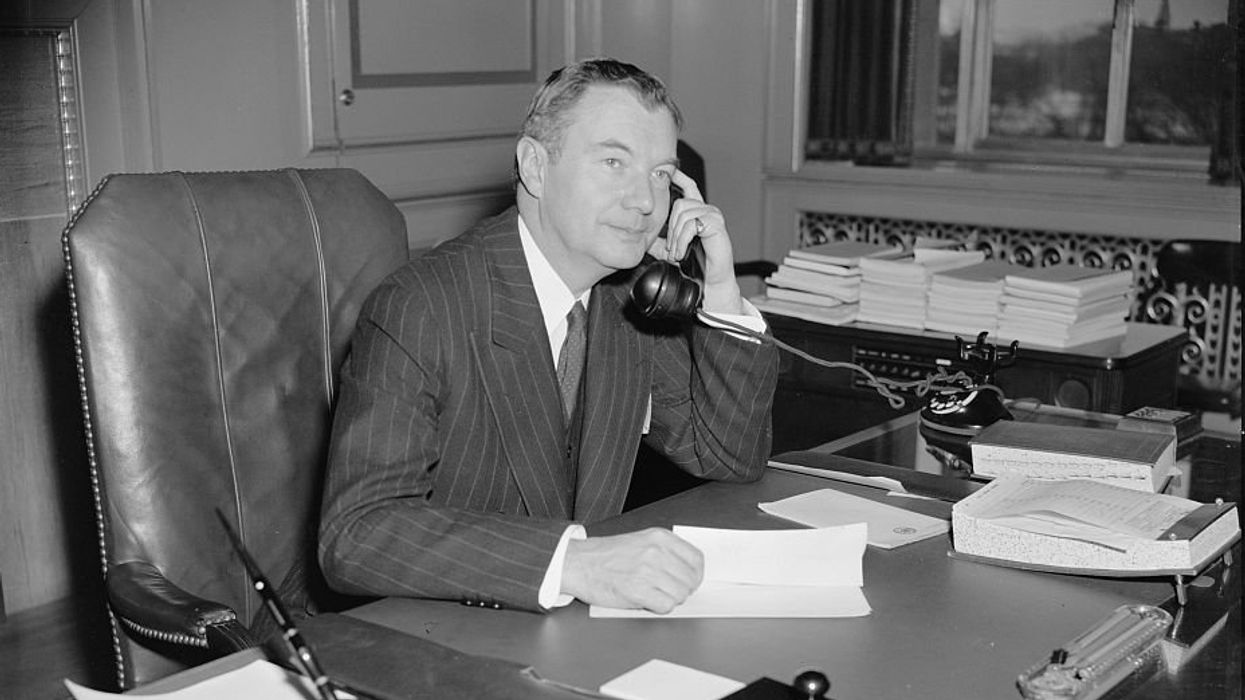Robert H. Jackson was a towering figure in American jurisprudence. The only jurist to serve as solicitor general, attorney general and associate justice of the U.S. Supreme Court, Jackson was a fierce defender of the rule of law. He was also a noted empath. He felt duty-bound to pause his tenure on the high court to prosecute Nazi war criminals in Nuremberg. His impressive legacy on and off the bench is secure.
Jackson’s long and distinguished legal career is probably best remembered for a single concurring opinion in a celebrated separation of powers case.
It all began on April 4, 1952. On that day, the Steelworkers Union, upset about substandard working conditions in the nation’s steel mills, called for a widespread strike. Fearing a massive disruption of steel production would jeopardize America’s war effort in Korea, President Harry Truman issued Executive Order No. 10340, instructing the secretary of commerce to confiscate the mills. The problem for Truman was that the Constitution did not authorize such a seizure and, more devastatingly, Congress had recently debated giving the president authority to seize private industries in times of crisis and had flatly rejected the idea.
Still, the case presented a tricky constitutional question: How broad is the president’s power in times of crisis?
That question would be answered quickly in this case. Indeed, any triumph for Truman was always going to be a longshot. Writing for the majority in the historic Steel Seizure case, Justice Hugo Black refused to bite on the president’s wager. Truman would have to stand down.
But the fundamental question about presidential command still remained. Over time, Jackson’s concurrence — filled with insight into the circumstances of the moment and warnings about the authority of the presidency — has emerged as a “fixed star in our constitutional constellation.” It is now the most influential separation of powers opinion in Supreme Court history.
Jackson never chastised Truman for trying to take control of the mills. He understood the urgency of the situation. But he also recognized that no crisis or emergency should ever supplant the rule of law.
He began his masterful opinion by acknowledging the difficulty of applying imprecise constitutional clauses to the “concrete problems of executive power.” It’s equivalent to divining from materials “almost as enigmatic as the dreams Joseph was called upon to interpret for Pharaoh,” he said.
Difficulties aside, he recognized that his duty was to weigh the potential crisis of the moment against any future leader who might attempt to extend even further “the executive Power” of the presidency. Presidents must have flexibility, he insisted: “Presidential powers are not fixed, but fluctuate, depending upon their disjunction or conjunction with those of Congress.”
But these political officials must also be controlled. Such flexibility can easily lead to authoritarianism. For Jackson, it is the design of government — separated powers and checks and balances — that provides the best antidote for executive supremacy.
Here he chided the solicitor general, Philip Perlman, for casually throwing around “loose and irresponsible adjectives” that tend to “color” all discussion of broad presidential power. No, a president doesn’t have “inherent,” “implied,” “incidental,” “plenary,” “war,” or “emergency” powers. He has constitutional powers. And, yes, those are limited. Even in times of crisis.
To permit the president to do much of anything without congressional approval, Jackson argued, is to concede “power that has no beginning or it has no end. If it exists, it need submit to no legal restraint.” And that, for Jackson, was dangerous. “I am not alarmed that it would plunge us straightaway into dictatorship,” he warned, “but it is at least a step in that wrong direction.”
Jackson’s lessons still resonate today. There is much talk about the “unitary executive theory” that grants virtually unchecked power to the nation’s chief executive. There is much talk about the relative impotence of Congress, an important institutional check on presidential power. There is much talk about a Supreme Court that yields a president considerable latitude and even more immunity. And there is much talk about a polarized nation that now worships a few of its elected leaders.
Justice Jackson begged for caution. He pleaded for restraint — guardrails, in other words. It begins in the people’s branch, he insisted. Congress. Members must be watchdogs, vigilant to the potential abuses of a president who claims “emergency powers.”
“With all its defects, delays, and inconveniences,” Jackson wrote, “men have discovered no technique for long preserving free government except that the Executive be under the law, and that the law be made by parliamentary deliberations.”
Sage advice from a wise counselor. Especially in these times.
Breslin is the Joseph C. Palamountain Jr. Chair of Political Science at Skidmore College and author of “A Constitution for the Living: Imagining How Five Generations of Americans Would Rewrite the Nation’s Fundamental Law.”




















Trump & Hegseth gave Mark Kelly a huge 2028 gift